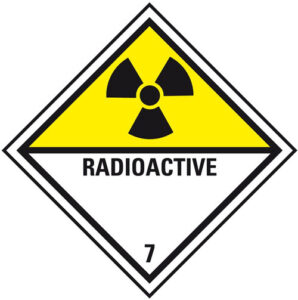In the area of dangerous goods, radioactive materials occupy a special place. Indeed, these substances represent a major but often imperceptible health risk, and their transportation and storage are subject to strict regulations and permits.
On this page, we share important information about radioactive materials in general and specifically their transportation and storage. You will also find information about our course offerings for transporting radioactive materials (Class 7) and the services we can help you with.
What do we mean by radioactive materials?
Radioactive substances are materials that emit ionizing radiation. This radiation can be dangerous to humans and the environment if not handled properly. Radioactive substances can be either naturally occurring or artificially produced.
Examples of natural radioactive materials are uranium and thorium. In addition, ionizing radiation can be generated artificially, mostly for medical applications in radiology and nuclear medicine. It is also used for industrial applications, such as electricity generation and food sterilization.
Transportation: International Atomic Energy Agency (IAEA) regulations
Transporting radioactive materials is subject to strict regulations to ensure human and environmental safety. The International Atomic Energy Agency (IAEA) has established guidelines for the safe transportation of radioactive materials.
These guidelines include packaging requirements, labeling, transportation methods and security measures. Compliance with these rules is crucial to minimize the risks posed by radioactive materials during transport.
Regulations for the different modes
IAEA regulations form the basis for the international transport regulations for specific modes, such as by road (ADR), rail (RID), sea (IMDG), inland waterways (ADN) and by air (ICAO/IATA). In it, separate sections are devoted to hazard class 7 (radioactive materials).
Storing radioactive materials safely
Like other dangerous goods, you certainly can’t just store radioactive sources. There are many rules to abide by and precautions to take to eliminate as much as possible human and environmental exposure.
This includes using shielded containers and maintaining a safe distance between the storage area and other facilities. In addition, the storage site should be regularly monitored for radiation levels and appropriate safety measures taken.
Rules for storage in the Netherlands
The rules for storing radioactive materials in the Netherlands are contained in various laws and regulations, including the Nuclear Energy Act.
The importance of a radiation expert
To work safely with radioactive materials on site, you cannot avoid a radiation expert. This is a professional who specializes in controlling, monitoring and minimizing exposure to ionizing radiation.
Radiation experts work widely in the medical, offshore, industrial and energy sectors where radioactive materials are used. First and foremost, they are responsible for ensuring that employees, other affected persons and the environment are protected from radiation.
Warning signs for radioactive materials
As with all dangerous goods, warning signs should make it clear that radioactive materials are present. This ensures that both people working with the materials and bystanders are aware of the risks.
The best-known warning sign is the three-leaf trefoil symbol (cloverleaf), which is internationally recognized as a symbol of radioactivity. This symbol is usually black against a yellow background and can be found on packaging, vehicles and storage facilities containing radioactive materials.

In addition to the trefoil symbol, additional warning labels and information about the specific radioactive substance may be displayed.
Courses for transportation of radioactive materials
As the training provider of logistics Netherlands, Special Cargo College has a large course offering regarding the transportation and control of dangerous goods. A number of courses specifically address the safe transportation, preparation or control of radioactive shipments:
- ADR Certificate Basic + Class 7 | Initial
- Road Transport of Radioactive Substances | ADR s12
- Air Transport Radioactive Materials | base
If you are looking for a specialized and experienced training provider for yourself or your employees, read more about one of these courses on our website or check out our full offerings.
Have radioactive materials safely stored or transported? Please contact us
If you want to be sure that the storage or transportation of your radioactive materials is safe and successful, you need to hire a specialist. You can find those at Special Cargo Services: we can measure, store, transport and document these resources.
Special Cargo has a continuous license for the transport of radioactive materials in the Netherlands, Germany, Belgium and Luxembourg and can always act quickly in this regard. Special Cargo Services also provides transportation to other countries within Europe.







